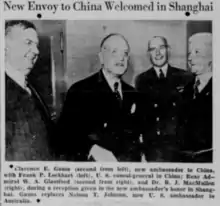Clarence E. Gauss
Clarence Edward Gauss (January 12, 1887 – April 8, 1960)[1] was an American diplomat.
Clarence E. Gauss | |
|---|---|
 | |
| Consul General of the United States, Mukden | |
| In office 1923–1924 | |
| Consul General of the United States, Tainan | |
| In office 1924–1926 | |
| Consul General of the United States, Tientsin | |
| In office 1927–1931 | |
| Consul General of the United States, Paris | |
| In office 1935–1935 | |
| Consul General of the United States, Shanghai | |
| In office 1935–1940 | |
| Preceded by | Monnett Bain Davis |
| Succeeded by | Frank P. Lockhart |
| United States Minister to Australia | |
| In office 1940–1941 | |
| Preceded by | New office |
| Succeeded by | Nelson T. Johnson |
| United States Ambassador to China | |
| In office 1941–1944 | |
| Preceded by | Nelson T. Johnson |
| Succeeded by | Patrick Hurley |
| Personal details | |
| Born | Clarence Edward Gauss January 12, 1887 Washington D.C. |
| Died | April 8, 1960 (aged 73) Los Angeles |
Personal background
Gauss was born in Washington, D.C., as the son of Herman Gauss and Emile J. (Eisenman) Gauss. He married Rebecca Louise Barker in 1917. He was a Republican and a Protestant.
Diplomatic career


Gauss was a career Foreign Service Officer for the United States Foreign Service. He was posted as U.S. Vice Consul in Shanghai, 1912–15; U.S. Consul in Shanghai, 1916; Amoy, 1916–20; Tsinan, 1920–23; U.S. Consul General in Mukden, 1923–24; Tsinan, 1924–26; Shanghai, 1926–27 (acting), 1935–38; Tientsin, 1927–31; Paris, 1935; Shanghai, 1935-1940. From 1940-41 he served as U.S. Minister to Australia, and was the United States ambassador to the Republic of China during the Second World War.[2] He resigned from the post in November 1944, and was replaced by Patrick Hurley.
Later life
After leaving diplomatic service, Gauss was director of the Export–Import Bank of the United States. He died at Good Samaritan Hospital in Los Angeles on April 8, 1960.[3]
References
- The United States in Asia: A Historical Dictionary
- U.S. Department of State, Office of the Historian. Gauss Clarence Edward
- "Former U.S. Ambassador to China, Australia Dies". Los Angeles Times. April 9, 1960. p. 3. Retrieved April 18, 2020 – via Newspapers.com.
External links
| Diplomatic posts | ||
|---|---|---|
| Preceded by Nelson T. Johnson |
US Ambassador to China 1941–1944 |
Succeeded by Patrick Hurley |
| Preceded by first incumbent |
U.S. Ambassador to Australia 1940–1941 |
Succeeded by Nelson T. Johnson |
